15 ways to keep snakes out of the chicken coop.
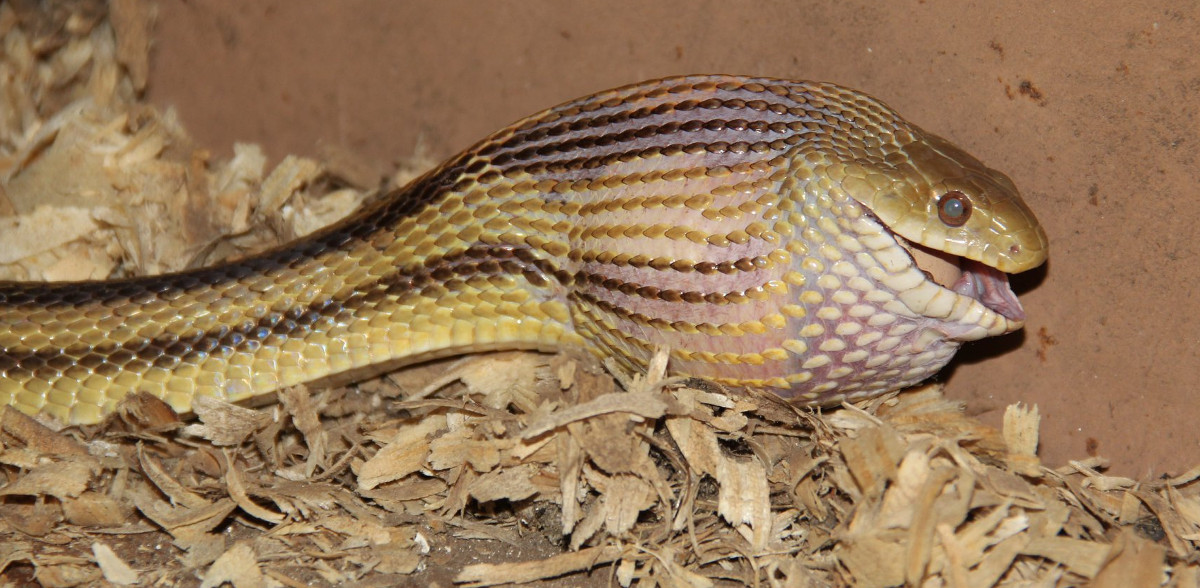
Lots of chickens keepers are rightfully worried about about snakes.
One end is after all surprisingly sharp and quick, and while only about 5% of snakes are poisonous they can still deliver a nasty bite needing treatment.
Table of Contents
- Why do snakes go into chicken coops?
- How do snakes get in chicken coops?
- Do snakes eat chickens?
- Where are snakes most likely to be a problem?
- Which species of snake cause problems for the chicken keeper?
- Signs you may have a snake in the chicken coop:
- How high can snakes climb?
- How Do I Make The Area Less Attractive For Snakes?
- 15 ways to make you backyard less inviting to snakes:
- Things you should not do with snakes:
- Do Snake Repellents Work?
- What is the best snake repellent FAQ?
- Can I Buy A Snake Proof Chicken Coop?
- Conclusion:
I was bitten a few years ago by a non venomous snake but still needed a course of antibiotics, swelled up badly and it hurt like hell.
Chickens do occasionally fall victim to snakes that are after an easy meal but for the most part the eggs are a much more attractive option. On the one hand snakes help reduce the numbers of rats and mice but on the other are also partial to chicken eggs or chicks, and on rare occasions, even adult chickens.
Below: A snake eating a chicken egg in the nest.
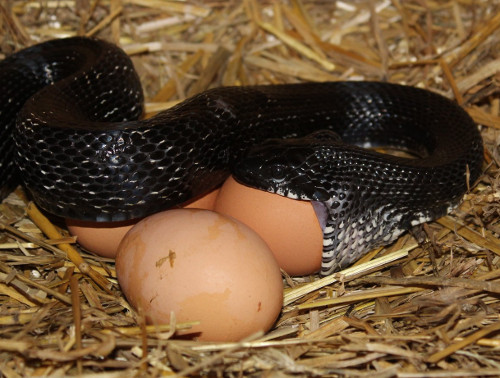
It is most likely that the snake you found on your property isn’t going to hurt you, but it can and they should always be handled with care. Fortunately for us as keepers, snakes have a tendency to try and avoid human contact at all costs so their reputation is not always justified.
The presence of snakes in and around your chickens can be dangerous for humans too, especially for young children who might inadvertently startle a snake hiding in the coop.
In some places it is illegal to kill snakes as they are protected, Australia is one I know of.
Why do snakes go into chicken coops?
Snakes come into coop for only three reasons:
- Feed. The snakes are after either the eggs, the chickens or the rodents that chickens sometimes attract.
- Water. Yes, snakes need water as well.
- Warmth, shade or shelter. Chicken coop tend to be warm and dry or provide shelter. or provide shade in the heat of the day.
When the egg production from your chickens suddenly begins to dwindle for no apparent reason, it could be a hungry rat or bull snake that has been snacking on your eggs!
Snakes may occasionally find themselves in a coop by accident but not normally.
Below: A harmless western rat snake sleeping off a meal in the nest box.
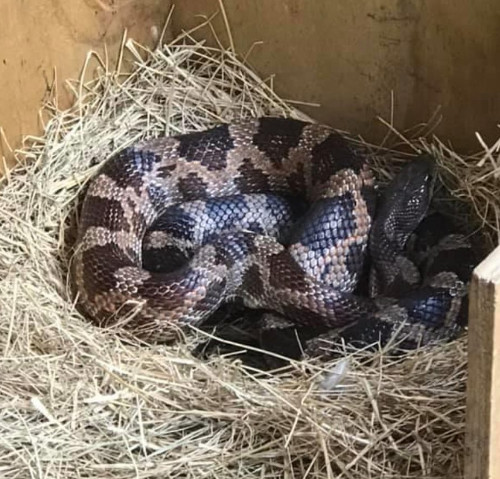
How do snakes get in chicken coops?
Snakes slither or crawl and can fit through any hole larger than their head. They can fit through any holes or cracks in the floor, walls or roof of the coop and most can get through the holes that are larger than 1/2 inch.
Snakes looking for a meal follow either the heat signatures or the urine paths of mice and rats. Vermin often urinate continuously while moving from one place to another and use the same routes day in, day out. These routes almost always lead to the chicken feed or your coop.
Do snakes eat chickens?
Yes, snakes do eat full grown chickens, however, it is more likely they are there for the eggs but snakes have eaten chicks out from underneath the mother hen and taken full grown chickens as well.
Snakes don’t eat daily, it may be 4 to 40 days or even longer before they return fop a refill.
Most snakes are too small to be a threat to adult chickens although a bite may well be fatal.
Finding a dead chicken with a wet head is a sign that a snake has tried to eat it and not been successful.
Where are snakes most likely to be a problem?
Looking at the snakebite chart for the United States we can see that that snakes bites almost exclusive happen in the southern states.
Below: The map of snakebite incidence from 2001 to 2005.
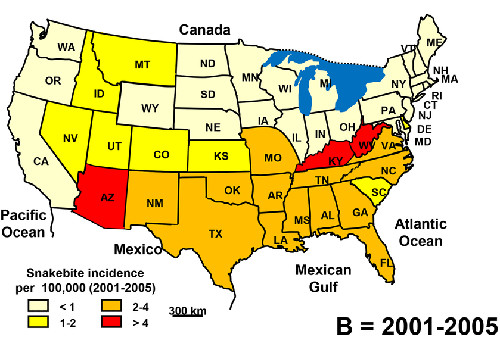
Snakes are unlikely to be a much of problem north of the 40 degree meridian as they will spend several months hibernating. That said there are 4 venomous types in parts of Canada but it becomes less likely to a problem the further north you go. Gray rat snakes found in Ontario can be up to 2.5 metres in length which is quite a monster in snake terms.
Which species of snake cause problems for the chicken keeper?
Rat, Bull and King snakes seem to the most common eggs thieves. Milk and Corn snakes have been seen eating eggs and there are reports of other types as well.
Below: A video of a snake eating an egg from the nest.
Rat snakes are often called chicken snakes because they gravitate to the easy meals in and around chicken coops. I have read rat snakes are the most abundant US snake and can be a variety of colours so identification can be difficult.
All snakes bite and strike faster than humans can move.
Signs you may have a snake in the chicken coop:
- Missing chicks. One going every few days.
- Fewer eggs in the nests. One snake can eat 2 eggs in a session.
- Regurgitated eggs shells. They always spit the crushed empty shell back up.
- Dead chicken with wet head. A sign the snake could not swallow the chicken whole.
- Shed snake skins.
How high can snakes climb?
This depends on the length of the snake for the most part but as a rule a snake can reach up between a half and two thirds of it's length especially if it has some other support.
Being high up won't keep snakes out of your hen houses nor will stairs as they can use them easily.
Below: Snakes can get up high quite easily.
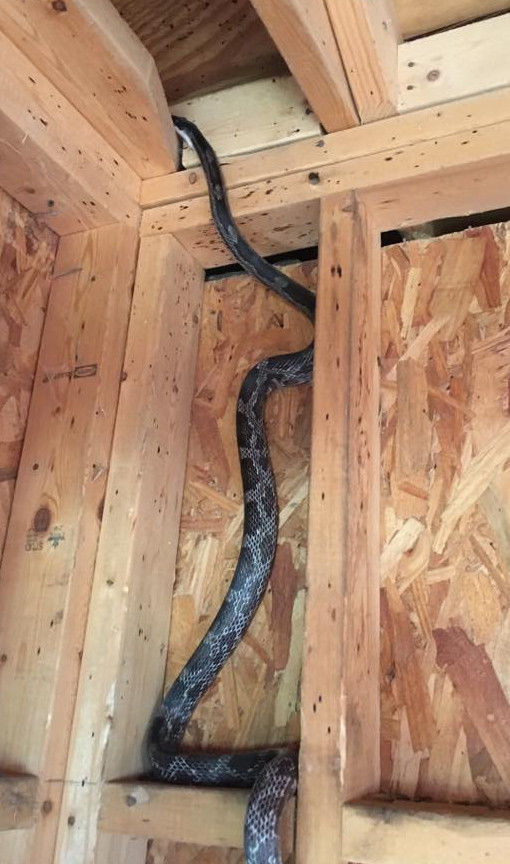
The only way that height can be used to help keep snakes out is if you have only slippery surfaces between the floor and the coop and nothing for them to get a purchase on or inverted cones on the legs.
Snakes are muscular and masters of using leverage to get where they need to be.
How Do I Make The Area Less Attractive For Snakes?
Exclusion of snakes by barrier methods is by far the best and easiest way to keep them out of the coop.
Snakes like all wild animals are looking for food and shelter. Unfortunately, the same food you give to your chickens may also attract rodents which in turn bring rodent predators.
Below: Fill gaps and cover entry points. Hiding places like this one make the snakes life easy.
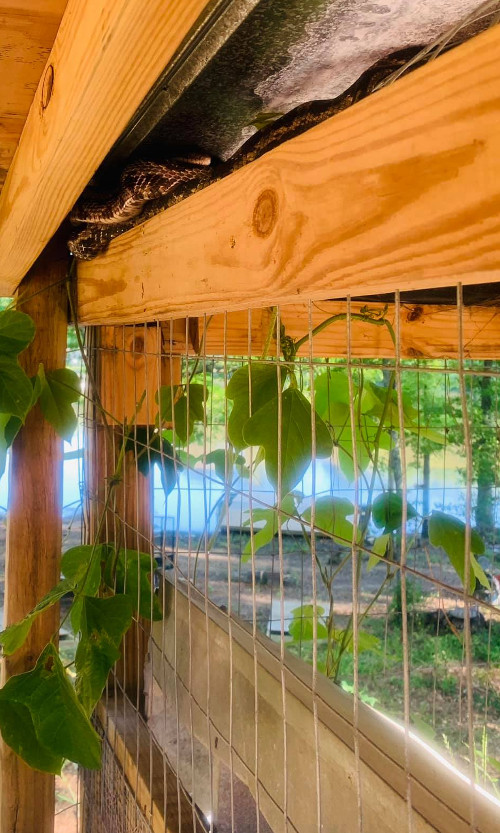
One of these rodent predators is snakes who see your chicken eggs, and occasionally chicks and chicken as a bonus snack. The chances are if you rodents you’ll eventually get snakes too.
There are essentially 4 basic things you can do to help with snakes, coop design, making the area less attractive for snakes, repellents and keeping their food source away.
15 ways to make you backyard less inviting to snakes:
- Take the time to learn more about snake identification and biology to avoid conflicts and misunderstandings.
- If you live in an area where snakes are a problem then you can also join a group like Free Snake Removal Directory to find re-locators in your area. Capturing and relocating animals yourself is rarely successful and may even be against the law.
- Minimising the chicken feed wastage and spillage. Store chicken feed in rodent-proof containers, and consider a treadle feeder that the chickens have to step on to access food.
- Regular trapping of vermin.
- Regular egg collection so there isn't the food source lying around.
- Short grass makes snakes easier to see by you and your family. Mow grass often as snakes prefer tall cover.
- Recruit allies like guinea fowl. The cantankerous guinea fowl is an absolute terror to snakes. With the proper introductions, they should get along great with your flock.
- Alternatively, consider buying or adopting a cat - they won’t necessarily help with your snake problem, but they will deal with any rodents quick smart.
- Elevate coop up on legs and use an inverted funnel form on legs, similar to those used for squirrel control.
- Use 1/4” hardware cloth on pens, buried into the ground. Hardware cloth over openings, spray foam in spots too small for hardware cloth. If your pinky can get through so can a snake.
- Make sure not to leave feed out at night after the birds are put away.
- Piles of lumber or firewood are prefect places for snakes to hide so keep areas clean and tidy. Remove cover and hiding places.
- Seal cracks and crevices on the hen house.
- Water features and landscaping can provide a home and resources for snakes so plan carefully.
- Electric fencing and wildlife specific fence. Fencing can help if it has a small enough mesh.
Lastly , remember to respect snakes, they are quick and bite and have been known to bite even after the head has been chopped off by reflex action so be careful if you plan on using a shovel or something else to deal with it. A blast from a water hose is usually enough to get even a stubborn snake moving.
Things you should not do with snakes:
- Set traps. I have seen recommendations for a bird netting trap, these are just a likely to catch your chickens and if you do catch a snake then you have an annoyed trapped animal to deal with.
- Poison. You could kill your poultry.
- Kill them. They are useful and eat rats and mice. They can bite by reflex even when dead.
In some places it is illegal to handle snakes or to trap and release them without a permit.
Do Snake Repellents Work?
No. Most snake repellents do not work on an ongoing basis.
I remember watching an episode of the Mythbusters a few years ago where they tested snake myths. They used cat litter, mothballs and cayenne pepper to try and repel snakes. While the snakes initially were put of and hesitated for a while, none of the things they tested actually repelled the snakes as such.
In the San Julian study into snake repellents in 1985 they studied a great many things and not one of them had any effect of on the movement of snakes across the test chamber.
They tested amongst other things mothballs, Sulphur, rope, lime, cedar oil and the stench of mercaptan, and not one thing put the snakes off. They tested both physical barrier and odour methods with little success.
Some people report success with electronic snake repellents. These send an electronic signal or ultrasonic vibration that is designed to repel snakes. They work initially but then the snakes get used to it.
What is the best snake repellent FAQ?
Do not use the barrier type sticky traps outside. Traps placed outside capture all sorts of non-target animals and result in a slow agonising death. If you do catch a snake in a sticky trap, you will just have to deal with a very annoyed snake stuck to a piece of plastic.
What smell do snakes hate?
None it seems, even if they dislike some smells they get used to them and they stop working as a repellent. Snakes really dislike the smell of ammonia won't come near it but it has to be very strong. Soak rags in ammonia and place them in unsealed plastic bags where you usually see the snakes. They will come back as the smell fades.
Do not use sulphur. Snake-away products claim that sulphur in their products keeps snakes away. Unfortunately sulphur is not effective at deterring snakes and is a waste of money (San Julian, 1985).
Does human urine repel snakes?
The plan is to collect your urine and spread it round the boundary. Whether this works or not is open to much debate but as a rule all snakes have an inbuilt fear of humans, more so than we have of them, so maybe the scent of man may keep them away.
Do moth balls really keep snakes away?
Do not use mothballs, the Myth busters tested it and it doesn't work at all. The active ingredient in mothballs is naphthalene or paradichlorobenzene. These chemicals are toxic to insects and mammals, but are not effective against snakes (San Julian, 1985). Also, you wouldn't want your chickens to get into them accidentally and get sick. Mothballs are a pesticide regulated by the EPA and using them outdoors and in this manner is illegal.
Do golf balls keep snakes away?
Do not use ceramic eggs or golf balls. It has often been said that if you put golf balls, glass, wooden or ceramic eggs in the nest boxes that snakes will eat them, be unable to digest them and die. Well, there are 2 major flaws in this theory, firstly snakes have an amazing sense of smell and will not be confused by false eggs, and secondly snakes can regurgitate quite easily. If you have ever watched a snake eat an egg they regurgitate the undigested eggshell after.
Do chickens help keep snakes away?
Yes, but they're not snake hunters like Guinea fowl. Chickens can kill snakes but they don't go out of their way to do it and they only pick on the really small ones that they could swallow whole.
Can I Buy A Snake Proof Chicken Coop?
Yes, you can buy chicken coops that are already snake proof.
They are only snake proof when installed properly on a level ground or hard surface.
You can make your current chicken coop more snake resistant with a coop apron of 1/4 in hardware cloth.
A solid, vertical fence 2-feet high deters the snake from entering an area. There should be no gaps or holes for the snake to enter through because snakes are good at that.
Conclusion:
Snakes do have advantages, rat snakes eat rodents and copperheads.
Snakes hate crossing open areas without the cover of brush and high grass because it leaves them vulnerable to predation.
Fill the gaps or holes around your pen with spray insulation foam.
Keep baby chicks in brooder and grow out pens constructed with 1/4 inch hardware cloth.
Collect your eggs regularly. Leaving eggs out provides opportunity and temptation.
Cut down or eliminate your rodent population.
The best most proven method when dealing with a snake infestation is to remove the habitat. Eliminate weeds, rocks, and clutter around the home, and the snakes have no place to hide.
